Religion as Fraud Is Boring
Why Not Try Harder With Your Conflict?
Tuesday, November 20, 2018 3:48 pm
There's a couple of things I dislike about the Ori arc in Stargate SG-1.
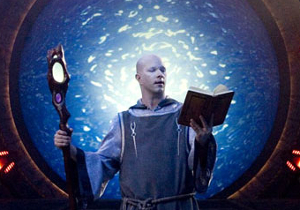 First, it is facile and cowardly to cast Origin, the religion of the evil Ori, as a sort of medieval Christianity. Of course the Ori instigate a crusade against our galaxy. Why not a jihad? Because modeling Origin on Islam and having Stargate Command oppose a jihad would, I suppose, be mean to brown people. Or something. Mustn't be phobic! Except, of course, against Christians. Natch.
First, it is facile and cowardly to cast Origin, the religion of the evil Ori, as a sort of medieval Christianity. Of course the Ori instigate a crusade against our galaxy. Why not a jihad? Because modeling Origin on Islam and having Stargate Command oppose a jihad would, I suppose, be mean to brown people. Or something. Mustn't be phobic! Except, of course, against Christians. Natch.
Second, the Ori offer enlightenment and outright ascension to their followers. Those who heed Origin will themselves become gods! But then it is revealed that this is a lie. The Ori want followers only to literally consume the energy of belief. Ascension will never be granted to anyone. Origin is a fraud.
This, I think, I dislike even more than the arc's implicit Christophobia — which, these days, I'm somewhat resigned to. Haters gonna hate. Amirite? But to posit a religion as a fraud? That is artistically tedious.
The modern screenwriter, being so far removed from true religion and bound, by his university-credentialed brilliance, to the truths of SCIENCE! alone, cannot even imagine religion as anything other than fraud. Gods aren't real; God isn't real. How do I know? The SCIENCE! tells me so!
We might, as Good Liberals, indulge the ethnic employment of religion. Aren't those Mexicans adorable with their Signs of the Cross? Aren't those Blacks adorable with their Gospel Spirituality? And my, the little bon mots we can extract from the religious expressions of these adorable ethnics! Despite the fraudulence of their silly religions.
But imagine the Ori weren't lying. Imagine that ascension truly awaited the followers of Origin. Imagine that Origin was not a fraud. Suddenly the Ori arc is interesting.
It's easy to fight charlatans. The moral high ground is so very high. But what if your foe is not a charlatan? Where then is your moral high ground? Is it right to oppose the dissemination of enlightenment? When the rewards are so great? The truths so real? True dilemmas arise. It's not so easy anymore. The Crusade has a point after all. It is bloody, yes. But not pointless. The conflict between the Ori and Stargate Command is suddenly deep.
Or at least not tedious.
Since I actually like the trappings of medieval Christianity, I mostly enjoy the Ori arc even as it irritates me. They squeezed a lot of decent adventure into two seasons. (Squeezed perhaps too much: One potentially deep and interesting story — the implantation of a Goa'uld into the incarnated avatar of the ascended Ori — was somewhat flaccidly disposed of in a single episode. That story should have been a three parter, the very climax of the Ori arc. Oh well.) I also like Tomin, and Vala's relationship with him. And finally I have one word for you: morenabaccarin.
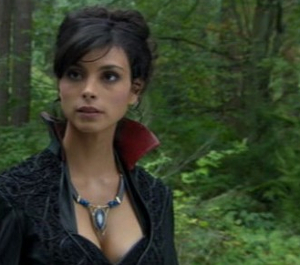

Second, the Ori offer enlightenment and outright ascension to their followers. Those who heed Origin will themselves become gods! But then it is revealed that this is a lie. The Ori want followers only to literally consume the energy of belief. Ascension will never be granted to anyone. Origin is a fraud.
This, I think, I dislike even more than the arc's implicit Christophobia — which, these days, I'm somewhat resigned to. Haters gonna hate. Amirite? But to posit a religion as a fraud? That is artistically tedious.
The modern screenwriter, being so far removed from true religion and bound, by his university-credentialed brilliance, to the truths of SCIENCE! alone, cannot even imagine religion as anything other than fraud. Gods aren't real; God isn't real. How do I know? The SCIENCE! tells me so!
We might, as Good Liberals, indulge the ethnic employment of religion. Aren't those Mexicans adorable with their Signs of the Cross? Aren't those Blacks adorable with their Gospel Spirituality? And my, the little bon mots we can extract from the religious expressions of these adorable ethnics! Despite the fraudulence of their silly religions.
But imagine the Ori weren't lying. Imagine that ascension truly awaited the followers of Origin. Imagine that Origin was not a fraud. Suddenly the Ori arc is interesting.
It's easy to fight charlatans. The moral high ground is so very high. But what if your foe is not a charlatan? Where then is your moral high ground? Is it right to oppose the dissemination of enlightenment? When the rewards are so great? The truths so real? True dilemmas arise. It's not so easy anymore. The Crusade has a point after all. It is bloody, yes. But not pointless. The conflict between the Ori and Stargate Command is suddenly deep.
Or at least not tedious.
Since I actually like the trappings of medieval Christianity, I mostly enjoy the Ori arc even as it irritates me. They squeezed a lot of decent adventure into two seasons. (Squeezed perhaps too much: One potentially deep and interesting story — the implantation of a Goa'uld into the incarnated avatar of the ascended Ori — was somewhat flaccidly disposed of in a single episode. That story should have been a three parter, the very climax of the Ori arc. Oh well.) I also like Tomin, and Vala's relationship with him. And finally I have one word for you: morenabaccarin.

Ageless Ideals, Not Outworn Machinery
What The Crown Neglects to Tell
Wednesday, October 10, 2018 1:15 pm
Whenever you watch a historical drama, of course you wonder, "What is true in this?" Especially when you see the bend of the narrative, you wonder what has been left out as unhelpful or distracting. Now, there is nothing wrong with editing history for the sake of a tale; it's just best to treat any historical drama as fiction.
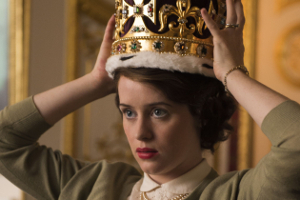 The Crown, the Netflix series about the reign of Queen Elizabeth II, definitely has a bend. It is firmly on the side of "the modern" — that is, the Modern as worshiped these past many decades: the casting aside of all acquired wisdom because, well, we're not stuffy and oppressive anymore.
The Crown, the Netflix series about the reign of Queen Elizabeth II, definitely has a bend. It is firmly on the side of "the modern" — that is, the Modern as worshiped these past many decades: the casting aside of all acquired wisdom because, well, we're not stuffy and oppressive anymore.
In particular it goes on and on about how the prohibition against divorce, and the disdain for divorced persons, is just so cruel. Never once does it explain why the prohibition exists or why people might think it a good thing. For The Crown, the prohibition is just a manifestation of adherence to outdated thinking.
In general, The Crown is all about the modernization of the monarchy. One could say: the steady erosion of its dignity. The royals, especially Elizabeth, are shown as people beset and powerless. She is a Queen with no constitutional power who, because of the supremacy of the Modern, finds herself bowing to every modernization.
As drama, The Crown is actually really good. And it is not disdainful, as such, of the actual dignity of the monarchy itself. By and large, especially with its honest (if agnostic) acknowledgement of the place of the Divine in the whole scheme, it avoids caricaturing the monarchy as merely some gilded vestige. Elizabeth is presented quite sympathetically. And yet, its greatest praise for her comes when she modernizes; not when she awkwardly tries to protect the monarchy as it has been.
And I think that, in adhering to its bend, it shows Elizabeth as weaker than she truly was. While there is no question that this second Elizabethan age has been a disaster and Britain is truly dead now (frankly, because of its descent into the Modern and, of late, its actual contempt for actual Britons), the real Elizabeth may have tried a little harder to resist.
In one episode (and in reality), Elizabeth concedes that there is something distant about the monarchy and agrees to the televising of her Christmas message. In the broadcast she says the following:
However, in reality, there was much else between "all around us" and Pilgrim's Progress. I wouldn't expect The Crown to repeat the entire broadcast, not least because it included some dull state-of-the-Commonwealth stuff. But some rather meaty content was excluded. Here is how the speech actually went:
I think it sad that the show did not depict this Elizabeth, the one who at least cried out as she was being struck down. But The Crown doesn't want to engage the arguments of the real Elizabeth. Rather it accepts submission to the Modern as inevitable and decides simply to depict the human drama of the Crown's submission.
P.S. A silly thing The Crown does is reckon Elizabeth's sex as a rationale for the modernization. You know: Women are breaking free of so much in this glorious new age! And now even the Monarch is a wahman! As if the monarchy had no provision for a female Monarch; as if two of England's greatest Monarchs were not women; as if only a half century before Elizabeth there had not been Victoria. Very silly.

In particular it goes on and on about how the prohibition against divorce, and the disdain for divorced persons, is just so cruel. Never once does it explain why the prohibition exists or why people might think it a good thing. For The Crown, the prohibition is just a manifestation of adherence to outdated thinking.
In general, The Crown is all about the modernization of the monarchy. One could say: the steady erosion of its dignity. The royals, especially Elizabeth, are shown as people beset and powerless. She is a Queen with no constitutional power who, because of the supremacy of the Modern, finds herself bowing to every modernization.
As drama, The Crown is actually really good. And it is not disdainful, as such, of the actual dignity of the monarchy itself. By and large, especially with its honest (if agnostic) acknowledgement of the place of the Divine in the whole scheme, it avoids caricaturing the monarchy as merely some gilded vestige. Elizabeth is presented quite sympathetically. And yet, its greatest praise for her comes when she modernizes; not when she awkwardly tries to protect the monarchy as it has been.
And I think that, in adhering to its bend, it shows Elizabeth as weaker than she truly was. While there is no question that this second Elizabethan age has been a disaster and Britain is truly dead now (frankly, because of its descent into the Modern and, of late, its actual contempt for actual Britons), the real Elizabeth may have tried a little harder to resist.
In one episode (and in reality), Elizabeth concedes that there is something distant about the monarchy and agrees to the televising of her Christmas message. In the broadcast she says the following:
Twenty-five years ago my grandfather broadcast the first of these Christmas messages. Today is another landmark because television has made it possible for many of you to see me in your homes on Christmas Day. My own family often gather round to watch television as they are this moment, and that is how I imagine you now.To this point her speech has been identical to her actual speech in 1957; at this point, she then goes into a reading of a passage from Pilgrim's Progress, the same passage she read in reality.
I very much hope that this new medium will make my Christmas message more personal and direct.
It is inevitable that I should seem a rather remote figure to many of you. A successor to the Kings and Queens of history; someone whose face may be familiar in newspapers and films but who never really touches your personal lives. But now at least for a few minutes I welcome you to the peace of my own home.
That it is possible for some of you to see me today is just another example of the speed at which things are changing all around us.
However, in reality, there was much else between "all around us" and Pilgrim's Progress. I wouldn't expect The Crown to repeat the entire broadcast, not least because it included some dull state-of-the-Commonwealth stuff. But some rather meaty content was excluded. Here is how the speech actually went:
That it is possible for some of you to see me today is just another example of the speed at which things are changing all around us. Because of these changes I am not surprised that many people feel lost and unable to decide what to hold on to and what to discard. How to take advantage of the new life without losing the best of the old.The Elizabeth in The Crown would not say this. If she did, she would be resisting the narrative itself. Note especially how she calls out those who would have "morality in personal and public life made meaningless [...] and self-interest set up in place of self-restraint;" those who, in other words, would commit their adulteries, fornications, and divorces and then get all tetchy about any objections to or consequences for their actions.
But it is not the new inventions which are the difficulty. The trouble is caused by unthinking people who carelessly throw away ageless ideals as if they were old and outworn machinery.
They would have religion thrown aside, morality in personal and public life made meaningless, honesty counted as foolishness and self-interest set up in place of self-restraint.
At this critical moment in our history we will certainly lose the trust and respect of the world if we just abandon those fundamental principles which guided the men and women who built the greatness of this country and Commonwealth.
Today we need a special kind of courage, not the kind needed in battle but a kind which makes us stand up for everything that we know is right, everything that is true and honest. We need the kind of courage that can withstand the subtle corruption of the cynics so that we can show the world that we are not afraid of the future.
It has always been easy to hate and destroy. To build and to cherish is much more difficult.
I think it sad that the show did not depict this Elizabeth, the one who at least cried out as she was being struck down. But The Crown doesn't want to engage the arguments of the real Elizabeth. Rather it accepts submission to the Modern as inevitable and decides simply to depict the human drama of the Crown's submission.
P.S. A silly thing The Crown does is reckon Elizabeth's sex as a rationale for the modernization. You know: Women are breaking free of so much in this glorious new age! And now even the Monarch is a wahman! As if the monarchy had no provision for a female Monarch; as if two of England's greatest Monarchs were not women; as if only a half century before Elizabeth there had not been Victoria. Very silly.
The Rot Is Deep
It's All So Casual Now
Sunday, September 17, 2017 9:03 pm
So, on Netflix, I'm watching The Blacklist, that show starring James Spader. Generally it's just cool and outrageous. Like most modern TV, though, it can't merely deliver its clever plot but must also deliver an Approved Point of View.
It is particularly annoying when Reddington, an amoral killer, goes on some dogmatic rant about, oh, religious intolerance of sodomy. The writers, in their own real lives, hate (or at least must seem to hate) such intolerance, and so they can't help but depict their "hero" as doing the same — even if it makes him, at least briefly, a mouthpiece instead of a person.
Sadly, though, I experienced a more dispiriting moment in the show. Dogmatic rants at least indicate the writers are aware that they are taking positions. What happens when the rot is utterly unconscious?
In one episode, children who are retarded and mentally afflicted are being given, by their parents, to a loony witch-like woman. The parents are essentially disposing of their children. A member of the FBI task force, speaking of Ethan (one of the children) and his mother Jeanne (who disposed of him), says:
Or as we used to say: his "mother."
The writers find it obviously tragic that Jeanne had to prioritize being a mother over being a wage slave. A woman is defined by having a job, after all; and caregiving is just an assignable task. There was no rant; no speech. Just a remark — almost casual — by a character explaining the situation.
Indeed, the rot has settled in.
It is particularly annoying when Reddington, an amoral killer, goes on some dogmatic rant about, oh, religious intolerance of sodomy. The writers, in their own real lives, hate (or at least must seem to hate) such intolerance, and so they can't help but depict their "hero" as doing the same — even if it makes him, at least briefly, a mouthpiece instead of a person.
Sadly, though, I experienced a more dispiriting moment in the show. Dogmatic rants at least indicate the writers are aware that they are taking positions. What happens when the rot is utterly unconscious?
In one episode, children who are retarded and mentally afflicted are being given, by their parents, to a loony witch-like woman. The parents are essentially disposing of their children. A member of the FBI task force, speaking of Ethan (one of the children) and his mother Jeanne (who disposed of him), says:
Ethan apparently requires around-the-clock care, medical therapy, speech and language therapy. In fact Jeanne quit her job to be Ethan's full-time caregiver.Notice the feminist worldview. Ethan required so much care that Jeanne had to quit her job. And for what? To become Ethan's "full-time caregiver."
Or as we used to say: his "mother."
The writers find it obviously tragic that Jeanne had to prioritize being a mother over being a wage slave. A woman is defined by having a job, after all; and caregiving is just an assignable task. There was no rant; no speech. Just a remark — almost casual — by a character explaining the situation.
Indeed, the rot has settled in.
Just Another Guy
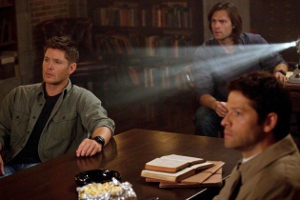 Generally I like what Supernatural does with Biblical mythology. Mind you, the writers are only scraping the mythology. They never explore the actual point of this or that story, but only steal from the cultural detritus of a society once Christian, re-purposing folktales they once half-heard in Sunday school.
Generally I like what Supernatural does with Biblical mythology. Mind you, the writers are only scraping the mythology. They never explore the actual point of this or that story, but only steal from the cultural detritus of a society once Christian, re-purposing folktales they once half-heard in Sunday school.
Take, for example, the arc about the Darkness and the Mark of Cain.
Beware! Spoilers follow.
So, before Creation, indeed before God, there was chaos, a force later called the Darkness. The Darkness was defeated by God and His Archangels and was locked away. The key to the cell containing the Darkness was entrusted to Lucifer (before his fall). Lucifer, having rebelled against God, used the key to corrupt Cain. The key became the Mark.
There have been three possessors, or keepers, of the key: Lucifer, Cain, and now Dean Winchester (one of the two brother heroes of the show, the other being Sam). Dean took on the Mark so that he could wield the First Blade (the very blade used to kill Abel) and destroy the last remaining Knight of Hell. The Knight is destroyed.
The Mark is corrupting, however, and Dean is becoming like Cain, the King of Murder. Sam conspires with a witch to remove the Mark from Dean. Unfortunately, if the key is not being held, the cell containing the Darkness will be opened. When the Mark is removed from Dean, the Darkness escapes.
No one quite realized what the Mark really was. The business about it being a key was not revealed until it was too late. Even then, given the bond between Dean and Sam (who have literally let the world suffer rather than let the other be ruined or taken away), Sam likely would not have stopped it anyhow.
Now, that is good mythmaking. I love the bit about the First Blade, the mere jawbone of a donkey that, having been used in the first murder, becomes a legendary weapon. I love how the Mark, in magical fashion, is itself a powerful object. And every episode with Cain is just great (the casting of Timothy Omundson, an actor I have otherwise never heard of, was somehow perfect).
You can see, of course, how this arc is not entirely Biblical. Its infidelity to Scripture is not the bothersome part. Nothing wrong — at all — with treating the Bible as a source of folktales to be reshaped in fiction. What bothers me, rather, are the polemical flavorings of the arc.
To begin with, Supernatural says that Cain did not kill Abel out of jealousy. Abel was not being faithful to God; he was worshiping Lucifer. Cain killed Abel to liberate his brother. In other words, Cain was motivated by love. The goody-two-shoes Abel was in fact beholden to the Evil One. Abel, like any other model to the Christian, was actually a deluded hypocrite.
How's that for a retcon? Why, it's only the conventional perspective of any de-Christianized modern.
It gets worse. It turns out the Darkness did not precisely predate God; it is, in fact, God's sister. God, though still the Creator in Supernatural's scheme, is really just a god, one of a two-member pantheon.
And because Supernatural cannot embrace the truly Christian definition of God as, in principle, being incapable of sharing a genus or family with anything, the writers are free to put God in the dock. Or, probably more to the point, intending to put God in the dock, they found it easier to diminish Him.
Ever since the Angels first appeared in Supernatural, back in the fourth season, the absence of God — His failure to help prevent even the Apocalypse, let alone the deaths or ruinations of characters — has been decried. Thematically, of course, God represents the absent Father, which plays off the failures of Dean and Sam's human father. But His absence (which, admittedly, is real enough to the superficial observer of the real world) also grounds Supernatural's judgments against Him.
For a long time I've tolerated Supernatural's take on Angels and Heaven and God. It is conventional nonsense about how following the mandates of Heaven — i.e., the will of God — is a loss of freedom. We are at our best when, like the crowd in Life of Brian, we cry out together, "We are all individuals!" We are better than Angels because we defy God. Supernatural takes this human self-worship to such a degree, that it casts Lucifer's rebellion as a refusal to venerate Mankind.
But again, I tolerated this because, hey, I have a soft spot for the monster-hunting and melodrama.
In the eleventh season, however, God makes an explicit appearance, and this is when the show becomes disappointing. The season itself has some good episodes (I particularly liked the one about imaginary friends), but the resolution of the Darkness storyline entails a rehearsal of every small-minded conception of God the Failure.
No. Wait. Turns out Chuck is God. Or rather, this is how God manifests Himself. Yet it's not an act. God really is a sad sack. He is petulant and whiny. He doesn't listen to prayers. He stopped intervening miraculously because it was pointless. He is fatalistic. He ran away. Supernatural reduces God to One of Us. In fact Man has surprised and surpassed Him by creating music and nacho cheese. God may be the Creator, but at heart He is Chuck.
Supernatural's contribution to theodicy is that God is precisely as small as you fear that He is. Rather than deal with the problems of evil and suffering as, for example, does the Magisterium of the Catholic Church, especially in its great thinkers like Aquinas, Supernatural finds refuge in the usual, limited conception of God as a guy out of his depth, not much better than another Zeus.
Above all, this is an artistic failure in Supernatural. It is common enough. Supernatural is hardly alone in its portrayal of God; many college sophomores would concur. But it is facile. Imagine, rather, that Supernatural had foregone the Chuckism and dealt with the actual Christian God, the actual God. Artistically, yes, that would have been bad, too, since the previous seven seasons had not been preparing you for such a turn. But if the prep had been good, how much more intellectually interesting everything would have been!
By making God Chuck, the writers took the easy way out and, not so incidentally, allowed themselves to feel superior to the Deity who has so terribly failed us, we who are, despite all our faults, the most wonderful people ever.
Thus the Gospel of the Moderns.
God in Supernatural
Monday, January 23, 2017 8:00 pm

Take, for example, the arc about the Darkness and the Mark of Cain.
Beware! Spoilers follow.
So, before Creation, indeed before God, there was chaos, a force later called the Darkness. The Darkness was defeated by God and His Archangels and was locked away. The key to the cell containing the Darkness was entrusted to Lucifer (before his fall). Lucifer, having rebelled against God, used the key to corrupt Cain. The key became the Mark.
There have been three possessors, or keepers, of the key: Lucifer, Cain, and now Dean Winchester (one of the two brother heroes of the show, the other being Sam). Dean took on the Mark so that he could wield the First Blade (the very blade used to kill Abel) and destroy the last remaining Knight of Hell. The Knight is destroyed.
The Mark is corrupting, however, and Dean is becoming like Cain, the King of Murder. Sam conspires with a witch to remove the Mark from Dean. Unfortunately, if the key is not being held, the cell containing the Darkness will be opened. When the Mark is removed from Dean, the Darkness escapes.
No one quite realized what the Mark really was. The business about it being a key was not revealed until it was too late. Even then, given the bond between Dean and Sam (who have literally let the world suffer rather than let the other be ruined or taken away), Sam likely would not have stopped it anyhow.
Now, that is good mythmaking. I love the bit about the First Blade, the mere jawbone of a donkey that, having been used in the first murder, becomes a legendary weapon. I love how the Mark, in magical fashion, is itself a powerful object. And every episode with Cain is just great (the casting of Timothy Omundson, an actor I have otherwise never heard of, was somehow perfect).
You can see, of course, how this arc is not entirely Biblical. Its infidelity to Scripture is not the bothersome part. Nothing wrong — at all — with treating the Bible as a source of folktales to be reshaped in fiction. What bothers me, rather, are the polemical flavorings of the arc.
To begin with, Supernatural says that Cain did not kill Abel out of jealousy. Abel was not being faithful to God; he was worshiping Lucifer. Cain killed Abel to liberate his brother. In other words, Cain was motivated by love. The goody-two-shoes Abel was in fact beholden to the Evil One. Abel, like any other model to the Christian, was actually a deluded hypocrite.
How's that for a retcon? Why, it's only the conventional perspective of any de-Christianized modern.
It gets worse. It turns out the Darkness did not precisely predate God; it is, in fact, God's sister. God, though still the Creator in Supernatural's scheme, is really just a god, one of a two-member pantheon.
And because Supernatural cannot embrace the truly Christian definition of God as, in principle, being incapable of sharing a genus or family with anything, the writers are free to put God in the dock. Or, probably more to the point, intending to put God in the dock, they found it easier to diminish Him.
Ever since the Angels first appeared in Supernatural, back in the fourth season, the absence of God — His failure to help prevent even the Apocalypse, let alone the deaths or ruinations of characters — has been decried. Thematically, of course, God represents the absent Father, which plays off the failures of Dean and Sam's human father. But His absence (which, admittedly, is real enough to the superficial observer of the real world) also grounds Supernatural's judgments against Him.
For a long time I've tolerated Supernatural's take on Angels and Heaven and God. It is conventional nonsense about how following the mandates of Heaven — i.e., the will of God — is a loss of freedom. We are at our best when, like the crowd in Life of Brian, we cry out together, "We are all individuals!" We are better than Angels because we defy God. Supernatural takes this human self-worship to such a degree, that it casts Lucifer's rebellion as a refusal to venerate Mankind.
But again, I tolerated this because, hey, I have a soft spot for the monster-hunting and melodrama.
In the eleventh season, however, God makes an explicit appearance, and this is when the show becomes disappointing. The season itself has some good episodes (I particularly liked the one about imaginary friends), but the resolution of the Darkness storyline entails a rehearsal of every small-minded conception of God the Failure.
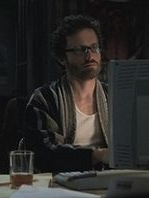 | See, this is Chuck. He is an anxious, agitated drunk. A loser. In a meta-fictional turn, he writes a series of books called Supernatural. He knows what has happened and will happen to the Winchesters. He, it seems, is a Prophet. |
No. Wait. Turns out Chuck is God. Or rather, this is how God manifests Himself. Yet it's not an act. God really is a sad sack. He is petulant and whiny. He doesn't listen to prayers. He stopped intervening miraculously because it was pointless. He is fatalistic. He ran away. Supernatural reduces God to One of Us. In fact Man has surprised and surpassed Him by creating music and nacho cheese. God may be the Creator, but at heart He is Chuck.
Supernatural's contribution to theodicy is that God is precisely as small as you fear that He is. Rather than deal with the problems of evil and suffering as, for example, does the Magisterium of the Catholic Church, especially in its great thinkers like Aquinas, Supernatural finds refuge in the usual, limited conception of God as a guy out of his depth, not much better than another Zeus.
Above all, this is an artistic failure in Supernatural. It is common enough. Supernatural is hardly alone in its portrayal of God; many college sophomores would concur. But it is facile. Imagine, rather, that Supernatural had foregone the Chuckism and dealt with the actual Christian God, the actual God. Artistically, yes, that would have been bad, too, since the previous seven seasons had not been preparing you for such a turn. But if the prep had been good, how much more intellectually interesting everything would have been!
By making God Chuck, the writers took the easy way out and, not so incidentally, allowed themselves to feel superior to the Deity who has so terribly failed us, we who are, despite all our faults, the most wonderful people ever.
Thus the Gospel of the Moderns.
In Vocation
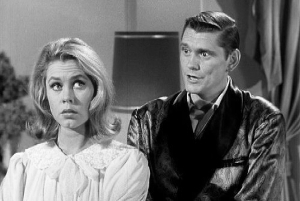 What does everyone know about Bewitched? It's about a free-spirited young witch whose uptight husband does everything he can to suppress her natural inclinations to magic.
What does everyone know about Bewitched? It's about a free-spirited young witch whose uptight husband does everything he can to suppress her natural inclinations to magic.
No. It's not.
Go back to the first season, before the show became focused on the farce, and you'll clearly see its theme. Abandon the feminist distortions and you'll see that Bewitched is about two newlyweds, thoroughly in love, who are trying to establish a normal, suburban life.
Both Samantha and Darrin have given up their prior lives; both have freely chosen their marriage; and both want it to be as it should be. What did Darrin give up? He's an executive at an ad agency, what the early 1960s considered to be the exemplar of white-collar hustle. To be sure, when he marries Samantha he keeps his job; but he does not keep the life of a Mad Man.
Sheila, an old flame, recently back from Nassau, having heard that Darrin is now married, invites him to a party. Come, she insists to a hesitant Darrin; everyone will be there. "We're your friends," she reminds him. So Darrin and Samantha go, thinking it's just a pot-luck; but of course Sheila has thrown a formal soiree. "Is this your little bride?" Sheila asks, superciliously, when the modestly dressed Samantha is presented to her. And during dinner Sheila goes on about Newport, Paris, Maxim's, the Riviera, Countessas and scandals… Darrin, though modestly from Missouri and not so wealthy himself, had been jetting with the jet-setters.
When, another time, Samantha is seeking a boyfriend for a friend of hers, she settles on a bachelor at McMann & Tate, an art director named Kermit. Darrin is doubtful. "Kermit's having a ball being single," Darrin says. "Women throw themselves at his feet. What a life that Kermit lives!" Samantha replies: "You were leading the same kind of life when you met me — and you were glad to give it up." Darrin, in other words, has chosen a new, more earthbound path — even though it takes him from his Nassau-hopping friends and his tomcatting ways, and is even apparently something of a financial burden, since, right away, quite naturally, as he seeks a home for himself and his wife, he must admit they will have to tighten their belts to buy a house.
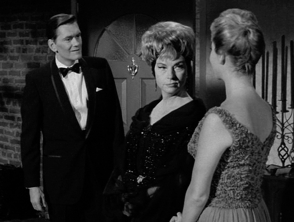 Indeed, it is class that truly animates the objections of Samantha's parents. Referring to mortals such as Darrin, Endora sneers: "They all look alike to me. Noses to the grindstone; shoulders to the wheel; feet firmly planted on the ground… No wonder they can't fly." Endora is as jet-setting as Sheila. Once, she drops in on Samantha, who is quietly playing solitaire at home, and invites her to lunch. Samantha agrees and suggests a little place around the corner. Endora counters by suggesting a bistro in Paris. Though Samantha hesitates, she agrees to go, and does enjoy herself. And Endora asks: "Don't you sometimes miss all this?" Samantha answers: "Not really. I have other things that make up for it." Endora is dismissive: "Like a snappy game of solitaire? Topped off by a gourmet lunch at the cozy Have-a-Snack?"
Indeed, it is class that truly animates the objections of Samantha's parents. Referring to mortals such as Darrin, Endora sneers: "They all look alike to me. Noses to the grindstone; shoulders to the wheel; feet firmly planted on the ground… No wonder they can't fly." Endora is as jet-setting as Sheila. Once, she drops in on Samantha, who is quietly playing solitaire at home, and invites her to lunch. Samantha agrees and suggests a little place around the corner. Endora counters by suggesting a bistro in Paris. Though Samantha hesitates, she agrees to go, and does enjoy herself. And Endora asks: "Don't you sometimes miss all this?" Samantha answers: "Not really. I have other things that make up for it." Endora is dismissive: "Like a snappy game of solitaire? Topped off by a gourmet lunch at the cozy Have-a-Snack?"
Another moment of snobbery comes when Maurice has been shown a picture of Darrin in an Army uniform. Maurice doesn't yet know Darrin is not a warlock, and so he is surprised that Darrin would have been in the Army. Samantha, unready to admit that Darrin is mortal, says: "Everybody goes into the service." Doubtful, Maurice replies: "Everybody, perhaps, but not us." While by "us" Maurice may only mean "we witches and warlocks," notice the flavor of it all: Maurice, haughty Maurice, a well-dressed, urbane man who has arrived in a limo, scorns a man who would join the Army. When Maurice learns what Darrin really is, he exclaims that his daughter has married a "common, ordinary mortal!" Endora, trying to placate him, says: "Times have changed. This happens in the best of families." Maurice is unpersuaded. "I can't understand it," he cries to Samantha. "A girl of your background, of your breeding!"
Now, of course Samantha did not merely descend from the upper classes. She descended from a higher plane. Her primary motivation is her love for Darrin, but she wholly enters into the role of wife. She wants to be a homemaker. She wants to make a home. In contrast, perhaps, to her maiden life; for her parents are clearly separated. When Maurice arrives, Endora says: "Nice to see you." When Maurice beholds Samantha, he remarks: "You must be my daughter;" and to Endora: "She turned into quite a girl." Endora, at one point, threatens to move in with Maurice.
Samantha does not come from a grounded, unbroken family.
When defending Darrin's plans to find them a house, Samantha says to Endora: "All young married people dream of owning their own home." And Endora declaims: "That's fine for them, Samantha, but not for us. We're quicksilver, a fleeting shadow, a distant sound. Our home has no boundaries beyond which we cannot pass. We live in music; in a flash of color. We live on the wind; in the sparkle of a star… And you want to trade it all for a quarter of an acre of crabgrass."
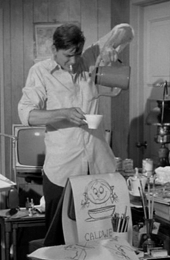
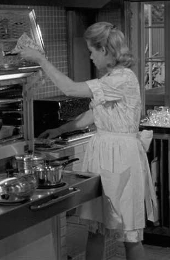 Yes, Samantha does want to trade it all: not for the crabgrass as such but for the house it surrounds: for the home inside the house. And Samantha knows that the proper way to make a home is to make it. A home is a thing of work. Shoulders to the wheel. Why, Endora wonders, doesn't Samantha just create that cup of coffee she wants, ex nihilo, with a twitch of her nose? Says Samantha: "This is a normal household and I'm trying to avoid witchcraft." Why be down on your knees, planting flowers, when you can just wish them into existence? "We're going to do it the right way — from seeds." Why not just wave your hands and clear this clutter so that we can leave already? "I'm going to stay here," Samantha says, "and clean this house with my own two hands." And now you're baking a cake? "I want to do something for my husband."
Yes, Samantha does want to trade it all: not for the crabgrass as such but for the house it surrounds: for the home inside the house. And Samantha knows that the proper way to make a home is to make it. A home is a thing of work. Shoulders to the wheel. Why, Endora wonders, doesn't Samantha just create that cup of coffee she wants, ex nihilo, with a twitch of her nose? Says Samantha: "This is a normal household and I'm trying to avoid witchcraft." Why be down on your knees, planting flowers, when you can just wish them into existence? "We're going to do it the right way — from seeds." Why not just wave your hands and clear this clutter so that we can leave already? "I'm going to stay here," Samantha says, "and clean this house with my own two hands." And now you're baking a cake? "I want to do something for my husband."
Do something. That is the nature of marriage: doing. This is precisely the sort of mundane work that Endora, because of her powers, because of her class, disdains. When Darrin wonders if, perhaps, he should relent, and let Samantha use her magic to help his career, he realizes: "If I do it once I'll do it again, and before you know, I won't be able to do anything for myself." Samantha has willingly joined Darrin in a life of doing for oneself — and hence for each other.
All motivated, as said, by love.
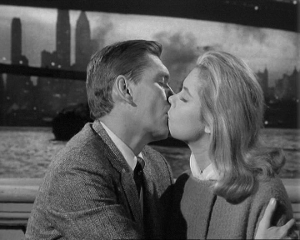 They've fallen hard for each other. They married before either had met the other's family; before, of course, Darrin even knew what Samantha is. They continually affirm their love to each other. There are many, slyly sweet scenes about their newlywed randiness. Considering that she is a witch and he a mortal, "I suppose I shouldn't have married you," Samantha says to Darrin, "but I love you so much." "I love you," says Darrin, "and I can't give you up."
They've fallen hard for each other. They married before either had met the other's family; before, of course, Darrin even knew what Samantha is. They continually affirm their love to each other. There are many, slyly sweet scenes about their newlywed randiness. Considering that she is a witch and he a mortal, "I suppose I shouldn't have married you," Samantha says to Darrin, "but I love you so much." "I love you," says Darrin, "and I can't give you up."
Impassioned though they are, they do not neglect that they are in a new state, a state of marriage. Sacrifices come for the sake of their normal household. Oh, Endora declares that Samantha can't change what she is. "I'm not trying to change," Samantha replies, "I'm trying to adjust." "He's trying to make you over," declares Endora; and Samantha counters: "He's doing no such thing." Samantha, for Darrin's sake, chose to abandon witchcraft.
In one episode, Darrin himself voices the feminist argument against Samantha's choice.
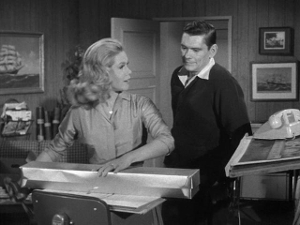 Then a gift comes to the house. Darrin had ordered this for their six-month anniversary — ordered it before his "liberation" of Samantha. The gift delights Samantha to the point of tears, for it is a gift he acquired for her not as a demigod but as her normal, loving husband. Then Darrin admits that he regrets the past couple of weeks. "Now I don't know," he says, "if I'm too crazy about the idea of never having to worry about anything anymore. Might be a good idea to worry about where your next meal is coming from. Gives you a chance to work up an appetite." Still tearful and happy, Samantha says: "Oh — You do understand!"
Then a gift comes to the house. Darrin had ordered this for their six-month anniversary — ordered it before his "liberation" of Samantha. The gift delights Samantha to the point of tears, for it is a gift he acquired for her not as a demigod but as her normal, loving husband. Then Darrin admits that he regrets the past couple of weeks. "Now I don't know," he says, "if I'm too crazy about the idea of never having to worry about anything anymore. Might be a good idea to worry about where your next meal is coming from. Gives you a chance to work up an appetite." Still tearful and happy, Samantha says: "Oh — You do understand!"
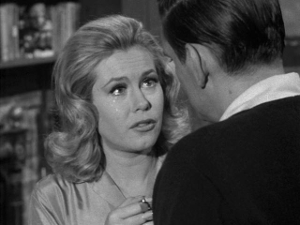 Samantha is not suppressed, repressed, or oppressed. "I'll be the best wife a man ever had." Samantha has chosen a certain way of being and, most importantly, a vocation for herself. The comedy of intermittent witchery comes, of course, in that vocations are often hard, especially since they usually involve some sort of self-control and a dedication to more than one's natural inclinations.
Samantha is not suppressed, repressed, or oppressed. "I'll be the best wife a man ever had." Samantha has chosen a certain way of being and, most importantly, a vocation for herself. The comedy of intermittent witchery comes, of course, in that vocations are often hard, especially since they usually involve some sort of self-control and a dedication to more than one's natural inclinations.
Witch and Wife
Monday, March 30, 2009 10:56 pm

No. It's not.
Go back to the first season, before the show became focused on the farce, and you'll clearly see its theme. Abandon the feminist distortions and you'll see that Bewitched is about two newlyweds, thoroughly in love, who are trying to establish a normal, suburban life.
Both Samantha and Darrin have given up their prior lives; both have freely chosen their marriage; and both want it to be as it should be. What did Darrin give up? He's an executive at an ad agency, what the early 1960s considered to be the exemplar of white-collar hustle. To be sure, when he marries Samantha he keeps his job; but he does not keep the life of a Mad Man.
Sheila, an old flame, recently back from Nassau, having heard that Darrin is now married, invites him to a party. Come, she insists to a hesitant Darrin; everyone will be there. "We're your friends," she reminds him. So Darrin and Samantha go, thinking it's just a pot-luck; but of course Sheila has thrown a formal soiree. "Is this your little bride?" Sheila asks, superciliously, when the modestly dressed Samantha is presented to her. And during dinner Sheila goes on about Newport, Paris, Maxim's, the Riviera, Countessas and scandals… Darrin, though modestly from Missouri and not so wealthy himself, had been jetting with the jet-setters.
When, another time, Samantha is seeking a boyfriend for a friend of hers, she settles on a bachelor at McMann & Tate, an art director named Kermit. Darrin is doubtful. "Kermit's having a ball being single," Darrin says. "Women throw themselves at his feet. What a life that Kermit lives!" Samantha replies: "You were leading the same kind of life when you met me — and you were glad to give it up." Darrin, in other words, has chosen a new, more earthbound path — even though it takes him from his Nassau-hopping friends and his tomcatting ways, and is even apparently something of a financial burden, since, right away, quite naturally, as he seeks a home for himself and his wife, he must admit they will have to tighten their belts to buy a house.

Another moment of snobbery comes when Maurice has been shown a picture of Darrin in an Army uniform. Maurice doesn't yet know Darrin is not a warlock, and so he is surprised that Darrin would have been in the Army. Samantha, unready to admit that Darrin is mortal, says: "Everybody goes into the service." Doubtful, Maurice replies: "Everybody, perhaps, but not us." While by "us" Maurice may only mean "we witches and warlocks," notice the flavor of it all: Maurice, haughty Maurice, a well-dressed, urbane man who has arrived in a limo, scorns a man who would join the Army. When Maurice learns what Darrin really is, he exclaims that his daughter has married a "common, ordinary mortal!" Endora, trying to placate him, says: "Times have changed. This happens in the best of families." Maurice is unpersuaded. "I can't understand it," he cries to Samantha. "A girl of your background, of your breeding!"
Now, of course Samantha did not merely descend from the upper classes. She descended from a higher plane. Her primary motivation is her love for Darrin, but she wholly enters into the role of wife. She wants to be a homemaker. She wants to make a home. In contrast, perhaps, to her maiden life; for her parents are clearly separated. When Maurice arrives, Endora says: "Nice to see you." When Maurice beholds Samantha, he remarks: "You must be my daughter;" and to Endora: "She turned into quite a girl." Endora, at one point, threatens to move in with Maurice.
Samantha does not come from a grounded, unbroken family.
When defending Darrin's plans to find them a house, Samantha says to Endora: "All young married people dream of owning their own home." And Endora declaims: "That's fine for them, Samantha, but not for us. We're quicksilver, a fleeting shadow, a distant sound. Our home has no boundaries beyond which we cannot pass. We live in music; in a flash of color. We live on the wind; in the sparkle of a star… And you want to trade it all for a quarter of an acre of crabgrass."


Do something. That is the nature of marriage: doing. This is precisely the sort of mundane work that Endora, because of her powers, because of her class, disdains. When Darrin wonders if, perhaps, he should relent, and let Samantha use her magic to help his career, he realizes: "If I do it once I'll do it again, and before you know, I won't be able to do anything for myself." Samantha has willingly joined Darrin in a life of doing for oneself — and hence for each other.
All motivated, as said, by love.

Impassioned though they are, they do not neglect that they are in a new state, a state of marriage. Sacrifices come for the sake of their normal household. Oh, Endora declares that Samantha can't change what she is. "I'm not trying to change," Samantha replies, "I'm trying to adjust." "He's trying to make you over," declares Endora; and Samantha counters: "He's doing no such thing." Samantha, for Darrin's sake, chose to abandon witchcraft.
In one episode, Darrin himself voices the feminist argument against Samantha's choice.
Darrin: I've been selfish, stupid, and unreasonable, and I want to ask for your forgiveness.You can lament Samantha's lack of consciousness; you can decry her supposed submission to patriarchy; but she knows what she wants a marriage to be. During that episode Darrin gets a taste of being a warlock, of having one's life enriched effortlessly. Samantha is not happy with his turn.
Samantha: I don't know what you're talking about.
Well, when we were married, you tried to fit yourself into my scheme of life.
I love you. I want you to be happy.
But what did I want? I wanted you to give up everything that was natural to you. I said, "No more witchcraft. Give it up." That's what I said. Isn't that what I said?
Yes, but I understand.
That's because you kept an open mind. But not me, no. My mind was closed, just like a clamshell. But that's all over.
Over?
Yes. From now on I want you to use that power whenever and wherever you want to.
Darrin — You don't really mean that?
I most certainly do. Why have I said to you, "No witchcraft. Don't help me, don't help yourself." Why? I ask you, Why? Well, I'll tell you why: It was ego. If I couldn't do it I didn't want you to do it. If I couldn't give something to you I didn't want you to have it. Ego! Pure ego. Simple as that.
Darling, that's not ego — that's the way it should be.


© 2004-26 David Skinner · All rights reserved